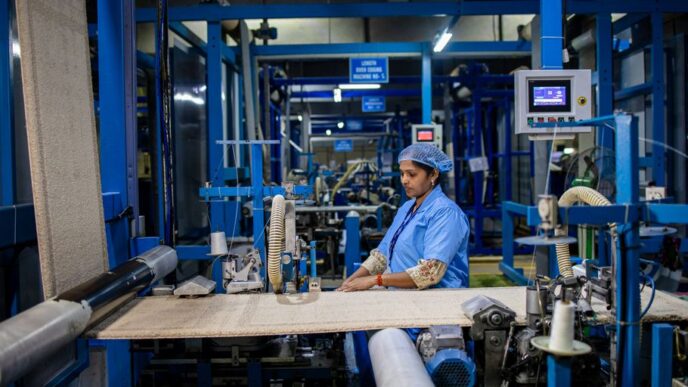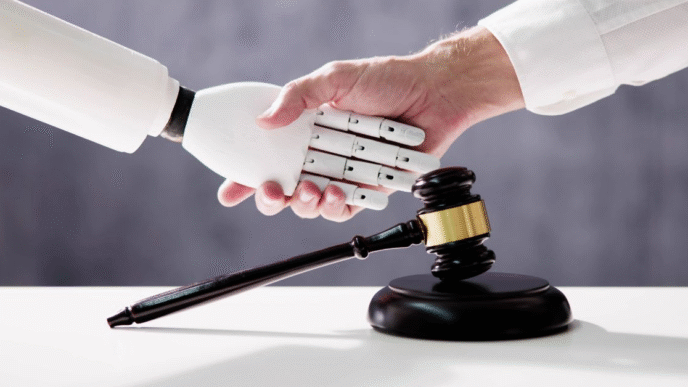Artificial Intelligence (AI) is changing how we shop in exciting ways. From making shopping feel personal to improving how stores operate, AI is reshaping the retail experience. This article explores the various ways AI is enhancing shopping, customer service, and inventory management, paving the way for a smarter retail future.
Key Takeaways
- AI helps create personalized shopping experiences for customers.
- Chatbots and virtual assistants improve customer service and support.
- AI optimizes inventory management, reducing waste and stock issues.
- Robotics and automation streamline supply chains and logistics.
- AI-driven marketing strategies target customers more effectively.
Personalized Shopping Experiences with AI
Artificial Intelligence (AI) is changing how we shop by making experiences more personal and enjoyable. With AI, retailers can tailor shopping experiences to fit individual preferences, boosting customer satisfaction. Here’s how AI is making shopping more personalized:
AI-Powered Recommendations
- Product Suggestions: AI looks at customer data to suggest products that shoppers are likely to want. This means if you’ve bought a pair of shoes, AI might suggest matching accessories.
- Continuous Learning: AI systems learn from customer interactions, improving their suggestions over time. The more you shop, the better the recommendations get!
- Example: Retailers like Target use AI to predict what customers might buy next, sending personalized offers to encourage purchases.
Dynamic Pricing Strategies
- Real-Time Adjustments: AI can change prices based on demand and competition. If a product is popular, the price might go up, while less popular items might see a drop in price.
- Market Awareness: AI keeps an eye on competitors, ensuring prices stay competitive. This helps retailers maximize sales and keep customers happy.
- Example: If a competitor lowers their prices, AI can quickly adjust to match or beat that price.
Customized Marketing Campaigns
- Targeted Ads: AI analyzes customer behavior to create ads that speak directly to individual shoppers. This means you’re more likely to see products you actually want.
- Customer Segmentation: By grouping customers based on their shopping habits, retailers can send tailored messages that resonate with different audiences.
- Example: Brands like Macy’s use AI to analyze customer feedback and improve their marketing strategies, ensuring they meet customer needs effectively.
AI is not just about selling products; it’s about creating a shopping experience that feels personal and engaging. By understanding customer preferences, retailers can build loyalty and satisfaction.
In summary, AI is revolutionizing the shopping experience by providing personalized recommendations, adjusting prices dynamically, and creating customized marketing campaigns. This not only enhances customer satisfaction but also drives sales for retailers.
Enhancing Customer Service through AI
AI is changing how retailers interact with customers, making service faster and more personal. With AI, businesses can provide tailored support that meets individual needs. Here’s how AI is enhancing customer service:
Chatbots and Virtual Assistants
- 24/7 Availability: Chatbots can assist customers at any time, answering questions and solving problems.
- Quick Responses: They can handle multiple inquiries at once, reducing wait times.
- Learning Capabilities: These systems improve over time by learning from past interactions.
Personalized Customer Interactions
- Understanding Preferences: AI analyzes customer data to offer personalized recommendations.
- Tailored Communication: Retailers can send targeted messages based on shopping habits.
- Proactive Engagement: AI can anticipate customer needs and reach out before issues arise.
Proactive Customer Support
- Predictive Assistance: AI can identify potential problems and address them before customers notice.
- Feedback Analysis: By analyzing customer feedback, AI helps improve service quality.
- Efficient Problem Resolution: AI tools can quickly access customer history to provide accurate solutions.
AI is not just about automation; it’s about creating a better experience for customers. By using AI, retailers can build stronger relationships and increase satisfaction.
In summary, AI is a powerful tool for enhancing customer service in retail. By implementing chatbots, personalizing interactions, and providing proactive support, retailers can significantly improve the shopping experience.
AI-Driven Inventory Management
In the retail world, AI is changing how we manage inventory. By using advanced technology, retailers can keep track of their stock more efficiently. Here are some key areas where AI makes a difference:
Demand Forecasting
- AI helps predict how much of a product will be needed.
- It looks at past sales data and trends to make accurate predictions.
- This helps stores avoid running out of popular items or having too much of something that doesn’t sell.
Automated Replenishment
- AI systems can automatically reorder products when they are running low.
- This ensures that popular items are always available for customers.
- It also helps reduce waste by preventing overstocking.
Reducing Overstock and Stockouts
- With AI, retailers can balance their inventory better.
- This means fewer instances of having too much or too little stock.
- Retailers can save money and improve customer satisfaction by having the right products available.
AI is not just a tool; it’s a game-changer for inventory management in retail. It helps businesses run smoothly and meet customer needs effectively.
By integrating AI into inventory management, retailers can enhance their operations and provide a better shopping experience for everyone.
| Feature | Benefit |
|---|---|
| Demand Forecasting | Accurate predictions for stock needs |
| Automated Replenishment | Always have popular items in stock |
| Reduced Overstock/Stockouts | Better balance of inventory levels |
Optimizing Supply Chain and Logistics
In today’s retail world, AI is changing how supply chains work. By using smart technology, businesses can make their supply chains faster and more efficient. Here are some key areas where AI is making a difference:
Efficient Route Planning
- AI helps find the best routes for deliveries, saving time and fuel.
- It considers traffic, weather, and other factors to ensure timely deliveries.
- This leads to lower costs and happier customers.
Real-Time Tracking
- With AI, companies can track shipments in real-time.
- This means they can see where products are at any moment, reducing delays.
- Customers can also get updates on their orders, improving their experience.
Warehouse Automation
- AI can automate tasks in warehouses, like sorting and packing.
- This speeds up the process and reduces human error.
- Automated systems can work 24/7, increasing productivity.
AI is not just a tool; it’s a game-changer for retail logistics. It helps businesses respond quickly to changes and meet customer needs effectively.
By implementing these AI-driven strategies, retailers can optimize their supply chains, leading to better service and increased profits. The future of retail logistics is bright with AI!
AI in Marketing and Merchandising
Targeted Advertising
AI is changing how retailers advertise by making it more personal. With AI, businesses can analyze customer data to create ads that fit individual preferences. This means customers see ads that are more relevant to them. Here are some benefits of targeted advertising:
- Increased engagement
- Higher conversion rates
- Better return on investment (ROI)
Content Generation
AI can help create content for marketing campaigns. It can write product descriptions, social media posts, and even emails. This saves time and ensures that the content is tailored to the audience. For example, an upcoming online store, active tailor, can use AI to generate engaging content that attracts potential customers before its launch.
Customer Segmentation
Understanding different customer groups is crucial for effective marketing. AI can analyze data to identify various segments based on shopping habits and preferences. This allows retailers to:
- Tailor marketing strategies for each group
- Improve customer satisfaction
- Increase loyalty
AI is not just a tool; it’s a game-changer in how retailers connect with their customers. By using AI, businesses can create more effective marketing strategies that resonate with their audience.
Revolutionizing In-Store Experiences
In today’s retail world, AI is changing how we shop. From smart technology to new ways of paying, stores are becoming more interactive and efficient. Here are some key innovations:
Smart Mirrors and Virtual Try-Ons
- Smart mirrors allow customers to see how clothes look without trying them on.
- Virtual try-ons let shoppers visualize products, like makeup or glasses, on themselves using augmented reality.
- These technologies enhance the shopping experience by making it more engaging and fun.
Cashier-Less Payments
- Many stores are adopting cashier-less systems where customers can simply walk out after scanning their items.
- This speeds up the checkout process and reduces long lines, making shopping more convenient.
- Examples include Amazon Go, where sensors and cameras track purchases automatically.
In-Store Robots
- Robots are being used for various tasks, such as restocking shelves and guiding customers.
- They can provide information about products and help shoppers find what they need.
- This not only improves customer service but also allows staff to focus on more complex tasks.
The integration of AI in retail is not just about technology; it’s about creating a better shopping experience for everyone.
By embracing these innovations, retailers are not only enhancing customer satisfaction but also streamlining their operations. The future of shopping is here, and it’s powered by AI!
AI for Sustainability in Retail
Artificial intelligence is playing a crucial role in making retail more sustainable. By optimizing resources, retailers can reduce waste and improve their eco-friendly practices.
Eco-Friendly Practices
- AI helps retailers analyze their supply chains to find inefficiencies.
- It suggests sustainable alternatives for products and processes.
- Retailers can monitor their energy usage and reduce their carbon footprint.
Waste Reduction
- AI systems can predict demand more accurately, minimizing excess inventory.
- They can identify products that are nearing expiration and suggest discounts to sell them quickly.
- Automated systems can streamline recycling processes in stores.
Sustainable Supply Chains
- AI can track the sourcing of materials, ensuring they are ethically sourced.
- It helps in optimizing transportation routes, reducing emissions.
- Retailers can use AI to collaborate with suppliers who prioritize sustainability.
AI is not just about efficiency; it’s also about creating a better future for our planet. By integrating AI into their operations, retailers can lead the way in sustainability efforts.
Future Trends in AI Retail
As we look ahead, several exciting trends are emerging in the world of AI and retail. These advancements are set to change how we shop forever.
Augmented Reality Applications
- Virtual Try-Ons: Customers can use AI-powered augmented reality to try on clothes and accessories virtually. This makes online shopping more interactive and fun.
- Interactive Displays: Stores are using AR displays to provide extra product information and reviews, creating a more engaging shopping experience.
Robotics Integration
- In-Store Assistance: AI robots are helping customers find products and answer questions, making shopping easier and faster.
- Warehouse Automation: Robots are also being used in warehouses to pick and pack orders, which speeds up delivery times.
AI and IoT Fusion
- Smart Devices: The combination of AI and Internet of Things (IoT) technology allows for smarter shopping experiences, like voice-activated shopping assistants.
- Data-Driven Insights: Retailers can analyze customer data in real-time to make better decisions about inventory and marketing.
The future of retail is bright with AI. As technology continues to evolve, retailers will find new ways to enhance customer experiences and streamline operations.
These trends show how AI is not just a tool but a game-changer in the retail industry, paving the way for a more personalized and efficient shopping experience.
Understanding Customer Behavior with AI
Artificial Intelligence (AI) is changing how retailers understand their customers. By analyzing customer data, businesses can learn about their preferences and what influences their buying decisions. This knowledge helps retailers create better shopping experiences.
Customer Data Analysis
- Identifying Patterns: AI looks at customer data to find trends, helping retailers understand what customers like.
- Improving Marketing: By grouping customers based on their behavior, retailers can tailor their marketing efforts to different groups.
- Real-Time Feedback: AI tools can analyze customer reviews and social media to gauge how customers feel about products.
Predictive Analytics
- Forecasting Needs: AI predicts what customers might want in the future based on their past behavior.
- Personalized Recommendations: By understanding customer preferences, AI can suggest products that customers are likely to buy.
- Enhancing Loyalty: Retailers can use insights from AI to create loyalty programs that resonate with their customers.
Behavioral Insights
- Understanding Shopping Habits: AI helps retailers see how often customers shop and what they buy.
- Tailored Experiences: Retailers can offer personalized experiences, such as special discounts or product suggestions based on individual shopping habits.
- Improving Customer Service: AI can help customer service teams provide better support by giving them access to customer history and preferences.
AI is not just about selling products; it’s about creating a deeper connection with customers. By understanding their behavior, retailers can build loyalty and improve satisfaction.
Improving Operational Efficiency with AI
Artificial Intelligence (AI) is changing how retailers operate, making them more efficient and effective. By using AI, businesses can save time and money while improving their services. Here are some key areas where AI is making a difference:
Labor Scheduling Optimization
- AI helps in creating better work schedules for employees, ensuring that the right number of staff is available at peak times.
- This reduces labor costs and improves customer service by minimizing wait times.
- Retailers can analyze past sales data to predict busy periods and adjust staffing accordingly.
Automated Task Management
- AI can automate repetitive tasks, such as inventory checks and order processing.
- This allows employees to focus on more important tasks, like helping customers.
- Automation leads to fewer mistakes and faster service.
Enhanced Decision Making
- AI provides valuable insights from data analysis, helping retailers make informed decisions.
- For example, AI can analyze customer buying patterns to suggest which products to stock more.
- This leads to better inventory management and reduces the chances of overstock or stockouts.
AI is not just a tool; it’s a game-changer for retailers looking to improve their operations and customer satisfaction.
In summary, AI is essential for retailers aiming to enhance their operational efficiency. By optimizing labor, automating tasks, and improving decision-making, businesses can create a smoother shopping experience for their customers.
The Role of AI in E-Commerce

Artificial Intelligence (AI) is changing the way we shop online. It helps make the shopping experience smoother and more enjoyable. AI tools can analyze customer data to provide personalized experiences that keep shoppers coming back.
Personalized Online Shopping
- AI can track what you look at and buy, suggesting items you might like based on your past behavior.
- For example, when you visit a site like active tailor, it can recommend sunglasses from their new collection based on your previous purchases.
- This makes shopping easier and more fun, as you find products that match your style.
AI-Driven Customer Support
- Chatbots are available 24/7 to answer questions and help with orders.
- They can handle many customers at once, ensuring quick responses.
- This means you don’t have to wait long for help, improving your overall shopping experience.
Dynamic Product Recommendations
- AI can adjust what products are shown based on current trends and customer preferences.
- This means that if a certain item is popular, it will be highlighted more prominently.
- Retailers can use this to boost sales and keep customers engaged with fresh options.
AI is not just a tool; it’s a game-changer in how we shop online. It makes the experience more personal and efficient, ensuring that customers find what they need quickly and easily.
Conclusion
In summary, artificial intelligence is changing the way we shop and how stores operate. With tools like chatbots, personalized recommendations, and smart inventory systems, shopping has become easier and more enjoyable for everyone. Retailers can now understand their customers better and offer them what they really want. As technology keeps improving, we can expect even more exciting changes in retail, making our shopping experiences smarter and more tailored to our needs.
Frequently Asked Questions
How is artificial intelligence changing the retail world?
AI is making retail smarter. It helps stores predict what customers want, manage their stock better, and even set the right prices. By understanding customers more, businesses can provide better service.
What does the future hold for AI in retail?
The future looks bright for AI in retail. It’s expected to grow and combine with new technologies like virtual reality to create even smarter shopping experiences.
Can AI really help boost sales in stores?
Absolutely! AI helps businesses understand what their customers like, so they can stock the right items and suggest products that people are more likely to buy.
What are some advantages of using AI in retail?
AI helps improve customer satisfaction, makes supply chains smoother, creates unique shopping experiences, and can even help reduce losses from items that don’t sell.
How does AI personalize shopping?
AI looks at customer data to offer tailored recommendations and promotions. This makes shopping feel more personal, as customers see products that fit their tastes.
What role do chatbots play in retail?
Chatbots provide instant help to customers. They can answer questions, suggest products, and even assist with purchases, making shopping easier and faster.
How does AI help with inventory management?
AI analyzes sales data to predict what items will be needed and when. This means stores can avoid running out of popular products or overstocking items that don’t sell.
Are there any eco-friendly benefits of using AI in retail?
Yes! AI can help retailers use resources more efficiently, reduce waste, and promote sustainable practices, making shopping better for the planet.













